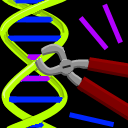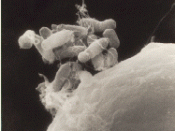Valuing Life Imagine that a man and woman just died. Upon their birth, scientists have pre-selected their eggs and sperm to reproduce a human being, unnaturally. The outcome: a superhuman made up of only the best characteristics, and another identical human figure cloned into the world. Will this scenario actually takes its place in the near future? The debate continues on.
Carol Foote presents the heated debate in "Narcissus Cloned,"ÃÂ which gives an assessment of the pros and cons on genetic engineering. She focuses her views on biologist James Bonner and chancellor of the University of Santa Cruz, Robert Sinsheimer.
We know that our world is made up of individuals who carry a set of attributes and characteristics that make up who we are. Today, scientists plan to use technology to create and kill new human embryos to clone them into human beings. This is there answer to improve mankind.
Is this how we want to control our destiny? Is the solution to control the number of people who can live in the world and to determine who can or cannot procreate an answer for the future? Although selective breeding may be a solution to improve the human genre, I believe that this process will not benefit society; the process is unethical and unconstitutional to the democratic society we are supposed to live in today, and perhaps cloning will damage our society socially and economically.
Despite the arguments that people have on genetic engineering, some people believe that this process will in fact happen one day. Science and technology seems to always be improving its process everyday. Now that the human genetic engineering process has been brought up for the future, people are continually experimenting with other sources such as food and animals to link their process towards cloning human beings. Scientists are trying to find ways to benefit the whole, and will do everything it takes until they are fully able to design a super human with the most important genetic characteristics. But are they really helping society? Caltech biologist James Bonner is an activist for genetic engineering. He states that sometime in the near future, such a procedure will exist to continue humanity as well as to improve it. "Everyone agrees we need to select for intelligence, longevity, high energy and freedom from genetic disease"ÃÂ (Bonner, as cited in Foote, 2000, p 233). With these characteristics, Bonner believes that this will in fact direct society to obtain the best individuals.
Although Bonner predicts that this theory will work, there are unanswered questions. Even if we could clone the characteristics we wanted, why would we want a copy of an individual? The process could only hurt individuality. Why would we want to destroy this? In "Narcissus Cloned,"ÃÂ Emmanuel Levinas, a French philosopher once argued that the cloning process is just to create a "mirror of oneself"ÃÂ (Levinas, as cited in Conley, 2000, p. 237). In the long run, what happens when a person gets convicted of a crime? With genetic engineering we won't be able to tell the difference from person A and B because A and B will have the same genetic code. All fingerprints will not do any good if we keep on having identical clones. When we do this, we will have no way to identify individuals. We must also consider that people with the best genetic characteristics commit crimes too. We cannot be sure to ourselves that even the smartest people will do harmful things to society. These are some questions that must be answered in order to continue this process.
According to Fordham University professor John Conley, "the practice of cloning undermines one of the key values of social interaction: human diversity"ÃÂ (2000, p. 237). When cloning occurs, we have no chance to learn from others because the same characteristics will be cloned. There is no room for learning, because the best would be cloned. We simply can't be different and carry our own views because genetic engineering won't allow us to. It is a loss of creativity and individuality.
Another critic to the consequences of genetic engineering is Robert Sinsheimer, chancellor of the University of Santa Cruz, who believes that it would be hard to determine what characteristics should be chosen when society can not foretell what is coming tomorrow. It is impossible to see what we will eventually need. We don't have that kind of supernatural power (Sinsheimer, as cited in Foote, 2000, p.234). The consequences that society will have to face is that when we clone humans with some of the genetic characteristics that might not be needed or wanted in the near future, we just have produced more human beings into an already overpopulated country. Will scientists then want to kill the clone that was created and produce another one? The costs to do this are too expensive. It does not make sense at all.
Furthermore, the idea to promote human genetic engineering is unethical and unnatural process to human kind because genetic engineering devalues the concept of a natural birth of a newborn baby. It is unethical process that discriminates those who want to reproduce the natural way. It also violates the rights of the clone individual. The Universal Declaration of the Human Genome and Human Rights even states that "producing a child by the new cloning technology is a practice that is contrary to human dignity and not to be permitted"ÃÂ (Tonti-Filippini, N. 2001, February. Retrieved July 2, 2001 from the World Wide Web: http://www.theage.com.au/news/2001/02/07/FFX3WFFGUIC.html.). The fact that we can take a gene from another person and take away life from the clone individual is clearly taking away something that invades individuals' humanity and dignity. It breaks their human rights for freedom, life, liberty, and pursuit of happiness as stated in the Universal Declaration. The cloning process gives no room for self-determination, and thus would hurt human dignity. We would not have any uniqueness in this world with cloning. Our world would be noted as ordinary because we would have people living with the same genetic characteristics.
Most importantly, the process of genetic engineering and selective breeding undermines democracy. With genetic engineering, we are capable of selecting a variety of genes within a species, but the people who have the ability to control who can and cannot procreate are the people who will dominate society. It strictly goes against our American Constitution of the first amendment. In the article "Designing Better Humans,"ÃÂ Sinsheimer continues to reason, "genetic technology will be accessible not only to the scientist, inventor, and physician but also to the military and to the fanatics . . . it gives scant reason to hope that such powers will be wielded solely in the interests of justice and mercy"ÃÂ (Sinsheimer, as cited in Foote, 2000, p. 233). It is discriminatory to figure out what kind of traits are worth cloning and what ideal candidates are necessary. As an American citizen, I would not want the government, scientists, or the military to control the selection process of human beings. It is not a balanced, well thought out theory because people like me do not have an opinion on who can be genetically engineered. Why should only a selected group have the opportunity to procreate? It isn't fair at all. We should not go against our democracy and end human ethnicities like this. In a democratic society, we all have equal rights as individuals. We would not develop as a country if we had only a minority of people running our country and creating an imbalance between each class. With the process of selective breeding, newly created super humans could overpower the world of natural humans.
The heated debate continues. If the process of genetic engineering is experimented, we know that one day we will be faced with these issues and will be force to deal with them. Those who think that genetic engineering will have only positive aspects will also face serious consequences in the long run. The consequences of striving for human perfection of human genre will only cause a world of identical people with no abilities to differentiate people with the most unique qualities and will cause society to follow unethical and unconstitutional ways of valuing life the right way.





